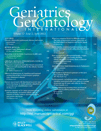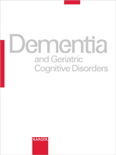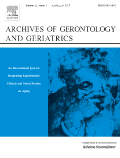
Geriatrics & Gerontology International
Scope & Guideline
Advancing the Science of Aging
Introduction
Aims and Scopes
- Multimorbidity and Geriatric Syndromes:
The journal frequently publishes research on the interplay between multiple chronic conditions, frailty, and geriatric syndromes, emphasizing the need for integrated care approaches. - Nutrition and Aging:
Research related to nutritional status, dietary interventions, and their impact on health outcomes among older adults is a core focus, addressing issues like sarcopenia and malnutrition. - Physical Activity and Functional Outcomes:
The journal highlights studies exploring the effects of physical activity interventions on mobility, frailty, and overall health in older populations, underlining the importance of maintaining functional independence. - Cognitive Health and Dementia:
A significant portion of the research is dedicated to cognitive decline and dementia, including diagnostic tools, treatment interventions, and the psychosocial aspects of caregiving. - Health Care Systems and Policy:
The journal examines healthcare delivery models, service utilization, and policy implications for aging populations, advocating for improved access and quality of care. - Innovative Therapeutic Approaches:
Emerging themes include the exploration of new therapeutic modalities and technologies, such as telemedicine and assistive devices, aimed at enhancing the quality of life for older adults.
Trending and Emerging
- Telehealth and Digital Interventions:
The rise of telehealth and digital health interventions has gained significant attention, particularly in the context of the COVID-19 pandemic, highlighting their role in enhancing access to care for older adults. - Frailty and Sarcopenia:
There is an increasing focus on frailty and sarcopenia, with studies exploring their definitions, assessment tools, and interventions aimed at prevention and management. - Social Determinants of Health:
Emerging research emphasizes the impact of social determinants on health outcomes in older adults, including studies on social isolation, community engagement, and mental health. - Integrative and Holistic Approaches:
Research is trending towards integrative care models that combine medical, nutritional, and psychosocial interventions to address the multifaceted needs of older adults. - Aging and Technology:
Innovations in technology, including robotics and artificial intelligence for elder care, are increasingly featured, reflecting a growing interest in enhancing care quality and efficiency.
Declining or Waning
- Traditional Pharmacological Interventions:
Research focusing solely on traditional pharmacological treatments for geriatric conditions is declining, as there is a growing emphasis on holistic and non-pharmacological approaches. - Acute Care Models:
The focus on acute care models for geriatric patients is waning, with more studies now emphasizing long-term care, community-based interventions, and preventive strategies. - Single-Disease Focus:
There is a noticeable decline in studies addressing single-disease perspectives, as the journal increasingly emphasizes the complexities of multimorbidity and comprehensive geriatric assessments. - Invasive Procedures and Surgeries:
Research on invasive procedures and surgeries in older adults is becoming less prevalent, potentially due to a shift towards less invasive, more conservative management strategies.
Similar Journals

European Journal of Geriatrics and Gerontology
Exploring innovative solutions for elderly care.Welcome to the European Journal of Geriatrics and Gerontology, a peer-reviewed platform dedicated to advancing knowledge and research in the fields of geriatrics and gerontology. Published by GALENOS PUBL HOUSE, this journal serves as a critical resource for researchers, healthcare professionals, and students who are involved in the care, treatment, and study of elderly populations. Since its inception in 2019 and running through 2024, the journal aims to foster interdisciplinary collaboration and disseminate innovative research that addresses the unique challenges faced by older adults. With an ISSN of 2687-2625, the journal is classified in the Q4 quartile of the Geriatrics and Gerontology category, signifying its emerging influence within the academic community, despite its current Scopus ranking of #113 out of 116, reflecting a rich opportunity for growth and visibility. Although the journal is not open access, it maintains a commitment to scholarly rigor and quality. Engage with the European Journal of Geriatrics and Gerontology to contribute to and learn from the evolving discourse in aging research.

Advances in Gerontology
Exploring the Future of Aging ResearchAdvances in Gerontology is a pivotal academic journal dedicated to the field of gerontology, published by PLEIADES PUBLISHING INC. With its ISSN 2079-0570 and E-ISSN 2079-0589, this journal serves as an essential platform for researchers, healthcare professionals, and students focused on aging and related health issues. Although currently not an open-access journal, it aspires to enrich the scholarly community by disseminating high-quality research from 2011 through 2024. The journal is recognized in the lower quartile of its category, ranking Q4 in both Geriatrics and Gerontology, reflecting its commitment to addressing emerging topics in the aging population despite its lower visibility in the competitive landscape. As it continues to explore critical areas in gerontology, Advances in Gerontology invites contributions that advance knowledge, foster understanding, and inform practices within this essential field of study.

Clinical Interventions in Aging
Transforming Aging with Evidence-Based SolutionsClinical Interventions in Aging is a premier Open Access journal published by DOVE MEDICAL PRESS LTD that has been at the forefront of geriatric research since its inception in 2006. With its core focus on innovative interventions and evidence-based practices to enhance the quality of life for the elderly, this journal serves as a vital resource for researchers, healthcare professionals, and students in the fields of geriatrics and gerontology. The journal boasts a commendable impact factor, achieving a Q2 ranking in Geriatrics and Gerontology and a Q1 ranking in Medicine (miscellaneous) as of 2023, highlighting its significant academic contribution. Notably, its Scopus ranking places it in the top 31% of its category, underscoring the relevance and quality of the research it publishes. With a commitment to advancing knowledge, this journal not only promotes accessibility through its Open Access model but also ensures that cutting-edge studies are readily available to those dedicated to improving geriatric care. Located in Auckland, New Zealand, the journal continues to expand its influence globally, making it an essential platform for discussions surrounding aging and health.

European Review of Aging and Physical Activity
Exploring the dynamic relationship between movement and aging.European Review of Aging and Physical Activity is a leading peer-reviewed journal published by SPRINGER HEIDELBERG, focusing on the intersection of gerontology and physical activity. With an impact factor placing it in the Q1 category for Geriatrics and Gerontology, this journal serves as a vital resource for researchers, healthcare professionals, and students dedicated to advancing the understanding of how physical activity influences aging. Open Access since 2015, it provides broad accessibility to its high-quality research, ensuring that pivotal findings are available to a global audience. The journal's Scopus ranking further underscores its impact, being positioned at #17 out of 116 in the field of Geriatrics and Gerontology, placing it in the 85th percentile. Published from Germany, the European Review of Aging and Physical Activity continues to address pertinent issues in the field, facilitating discourse and innovation for better health outcomes in aging populations.

DEMENTIA AND GERIATRIC COGNITIVE DISORDERS
Innovating solutions for cognitive decline in the elderly.DEMENTIA AND GERIATRIC COGNITIVE DISORDERS is a distinguished peer-reviewed journal published by KARGER, based in Switzerland. With a focus on the critical fields of cognitive neuroscience, geriatrics, and psychiatry, this journal is integral to advancing our understanding of cognitive decline and geriatric health. Despite being established from 1990 through 1992 and relaunching its scope in 1994, it has consistently provided a platform for innovative research, as reflected in its strong impact factor and notable Scopus rankings, placing it in the Q2 quartile for disciplines including cognitive neuroscience and geriatric medicine. The journal aims to foster interdisciplinary dialogue and collaboration among researchers, healthcare professionals, and educators, contributing to the growing field of dementia research and elderly care. Open access options further ensure that this vital knowledge is widely accessible, making a significant impact in both academic and clinical settings. With a commitment to quality and relevance, DEMENTIA AND GERIATRIC COGNITIVE DISORDERS remains a key resource for those dedicated to understanding and addressing the challenges posed by cognitive disorders in aging populations.

Salmand-Iranian Journal of Ageing
Exploring the science of ageing with accessibility.Salmand-Iranian Journal of Ageing is a pioneering open-access publication dedicated to advancing the knowledge and understanding of ageing and geriatric health. Launched in 2006 by NEGAH INST SCIENTIFIC COMMUNICATION, this journal serves as a vital resource for researchers, professionals, and students within the fields of Geriatrics and Gerontology. Published in Iran, it aims to provide a platform for disseminating innovative research and clinical findings pertaining to ageing, with a commitment to accessibility and scholarly excellence. The journal holds recognition in its category with a Q4 designation in Aging and a Q3 classification in Geriatrics and Gerontology (2023), indicating its growing influence in academic circles. Despite a current H-index designation of '-', the journal's impact within its scope continues to develop. As it converges research efforts from 2018 to 2024, it seeks to address the pressing challenges faced by the ageing population. With no cost barriers for readers, the Salmand-Iranian Journal of Ageing remains an essential tool for fostering dialogue and collaboration in the quest for improved senior health outcomes.

Journal of Frailty & Aging
Advancing knowledge in gerontology and geriatrics.Journal of Frailty & Aging, published by SPRINGER BASEL AG, is a leading platform dedicated to advancing research in the fields of aging, geriatrics, and gerontology. With an ISSN of 2260-1341 and an E-ISSN of 2273-4309, this journal has established itself as a pivotal resource for scholars and practitioners aiming to explore the complexities of frailty and its impact on aging populations. As of 2023, it proudly holds a Q3 classification in Aging and Q2 classifications in both Geriatrics and Gerontology, as well as Physiology (medical), alongside a notable Q1 ranking in Medicine (miscellaneous). The journal's Scopus ranks further reflect its quality and relevance, with rankings as high as #22 in Aging within the Biochemistry, Genetics and Molecular Biology category. The Journal of Frailty & Aging invites contributions that illuminate contemporary challenges and innovations in the field, offering Open Access to enhance the dissemination of knowledge. By publishing rigorous research and impactful reviews, the journal strives to foster a deeper understanding of health and well-being in older adults, making it an essential resource for researchers, healthcare professionals, and students engaged in this vital area of study.

ARCHIVES OF GERONTOLOGY AND GERIATRICS
Shaping the future of geriatric practice through research.The Archives of Gerontology and Geriatrics, published by Elsevier Ireland Ltd, is a leading journal in the fields of Aging and Geriatrics and Gerontology. With an ISSN of 0167-4943 and an E-ISSN of 1872-6976, it has established itself as a crucial platform for disseminating high-quality research focused on the biological and psychosocial aspects of aging. The journal holds an impressive Q2 ranking in both Aging and Geriatrics and Gerontology, and a Q1 ranking in Gerontology and Health (Social Science) as of 2023, reflecting its significant impact in these disciplines. Additionally, the journal is ranked #33/371 in Social Sciences (Health) and #5/39 in Nursing (Gerontology) according to Scopus, showcasing its esteemed position in the academic community. Although currently not open access, the journal offers a wealth of research articles from 1982 to the upcoming 2025 that are vital for stakeholders including researchers, healthcare professionals, and students aiming to advance their understanding of aging processes and policies. Titles published within its pages contribute to shaping agendas in public health and gerontological practice, making it an essential resource for those involved in the study of the elderly population.

Aging Medicine and Healthcare
Elevating Geriatric Health Through Collaborative ResearchAging Medicine and Healthcare is a leading Open Access journal dedicated to advancing the understanding of geriatric health and the complexities of aging. Published by the Asia Pacific League Clinical Gerontology & Geriatrics, this innovative journal began its journey in 2019 and has since established itself as an important resource for healthcare professionals, researchers, and students interested in the fields of geriatrics and gerontology. With an impact factor that reflects its growing significance (ranked in the 21st percentile within its category), the journal aims to disseminate high-quality research and practical insights that can inform clinical practice and enhance patient care for aging populations. As an Open Access publication, it ensures that research findings are freely accessible, fostering collaboration and knowledge sharing among academics and practitioners globally. The journal is poised to be a vital platform for innovative studies, systematic reviews, and case reports that illuminate the challenges and opportunities in aging medicine.

Gerontology and Geriatric Medicine
Exploring the complexities of aging with interdisciplinary studies.Gerontology and Geriatric Medicine is a distinguished journal published by SAGE Publications Inc, focusing on the vital field of gerontology and geriatrics. With an impressive Q2 ranking in Geriatrics and Gerontology as of 2023, this journal serves as a crucial platform for disseminating high-quality research and innovation related to aging and elderly care. Since embracing an Open Access model in 2015, it has broadened its reach, enabling scholars, researchers, and practitioners worldwide to access valuable insights without barriers. The journal’s scope encompasses a variety of interdisciplinary studies that address the multifaceted aspects of geriatric medicine, making it an essential resource for anyone dedicated to advancing knowledge and practices in this critical domain. With its commitment to enhancing the understanding of aging populations, Gerontology and Geriatric Medicine is poised to contribute significantly to the ongoing discourse and research developments in the care for older adults.